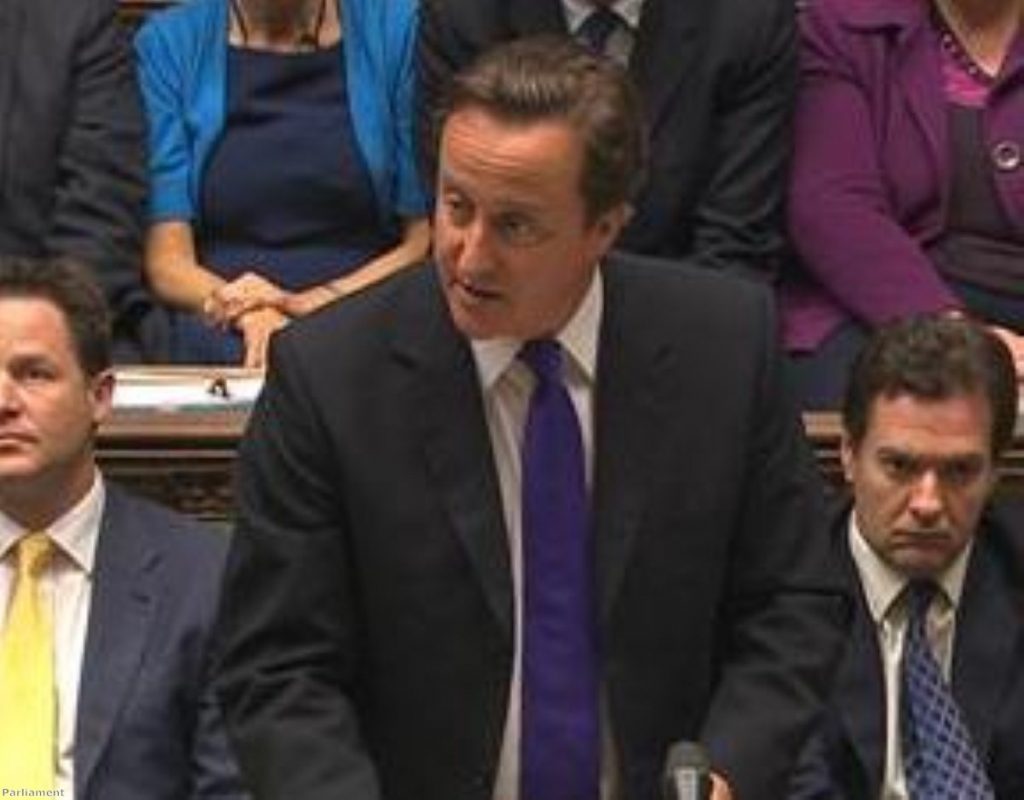Cameron confronts Commons’ phone-hacking anger
By Alex Stevenson Follow @alex__stevenson and Ian Dunt Follow @IanDunt/
David Cameron faced a hostile Commons this lunchtime as he confronted the political consequences of his decision to hire former No 10 communications chief Andy Coulson.
The prime minister answered over 130 questions from MPs after making a statement to parliament, which had been recalled especially as the phone-hacking scandal rumbles on.
MPs are now debating public confidence in the media and the police. But it was confidence in Mr Cameron's judgement which was the unnamed issue at stake earlier today.


Anger at phone-hacking and other journalist malpractices at the News of the World during the time when Mr Coulson was editor has left Mr Cameron exposed to criticism over his decision to hire him in Downing Street.
"It was my decision. I take responsibility," the prime minister said.
"People will, of course, make judgements about it. Of course I regret and I am extremely sorry about the furore it has caused."
He said that with "20:20 hindsight" he would not have offered Mr Coulson the job.
"But you don't make decisions in hindsight; you make them in the present," he added.
"You live and you learn – and believe you me, I have learned."
Mr Cameron also said he would say sorry if allegations that Mr Coulson knew about phone-hacking were true.
"I have an old fashioned view about 'innocent until proven guilty'," Mr Cameron said.
"But if it turns out I have been lied to, that would be a moment for a profound apology."
Labour leader Ed Miliband said the prime minister had made a "catastrophic error of judgement" and accused Mr Cameron of deliberately attempting to "hide from the facts".
He said the prime minister faced a "tragic conflict of loyalty" and suggested that former Metropolitan police commissioner Sir Paul Stephenson, who resigned on Sunday, had been put in an "impossible position".
Sir Paul said in his resignation statement that he was prevented from bringing the potential conflict of interest to Mr Cameron's attention because of his relationship with Mr Coulson.
It was revealed yesterday that the request actually came from Ed Llewellyn, Mr Cameron's chief of staff.
Mr Llewellyn's name was previously linked to phone-hacking after Downing Street admitted that he had failed to pass on warnings to the prime minister about his decision to hire Mr Coulson.
It was revealed yesterday that he was one of three special advisers working in Downing Street on a salary of £140,000 a year.
Yesterday it was revealed that Neil Wallis, a former News of the World deputy editor who was arrested last week over allegations of phone-hacking, offered advice to Andy Coulson, Mr Cameron's communications chief, during the 2010 election campaign.
This suggests that Mr Cameron was helped into Downing Street by a man who has already prompted the resignation of two of Britain's most senior policemen, following the revelation that he worked for the Met after leaving the newspaper.
Mr Cameron said Mr Wallis "may have provided Andy Coulson with some informal advice on a voluntary basis" before the general election.
As the scandal reaches closer and closer towards Downing Street, bookies have reduced the odds on Mr Cameron being forced from office because of the crisis.
That remains unlikely, but No 10 will be concerned that the prime minister may be permanently tainted by the crisis.
Recent admissions that he had dinner with James Murdoch, Rebekah Brooks and their partners just two days after taking away responsibility for the BSkyB deal from Vince Cable have prompted the Lib Dems' deputy leader Simon Hughes and party president Tim Farron to report the prime minister to the Cabinet Office secretary.

